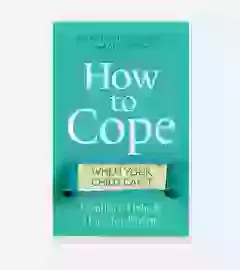Coping with unhelpful ways of thinking as a parent
How to Cope When Your Child Can’t gives comfort, hope and help to parents to ensure they are looking after themselves as well as supporting their child who might be struggling. In this abridged excerpt, the authors look at unhelpful thinking styles in parenting and how we can address them.
You might be familiar with the idea of thinking styles and unhelpful ways of thinking that are often called ‘errors’. If it is the first time you have come across the idea, then prepare to be amazed by the strange ways in which humans think and process information! Unhelpful ways of thinking were first properly described in the 1970s by Aaron Beck, the founding father of cognitive therapy, in his book on how to help emotional disorders. The idea is that thinking ‘errors’ are unhelpful patterns of thinking, and that identifying the thinking errors is the first step to helping you think differently and cope better with challenging situations. At the heart of cognitive therapy is the idea that the situation is the same, but your interpretation of the situation changes. And changing that interpretation is the key to coping because it can help to change the feelings and unhelpful behaviours (such as avoidance) that get in the way.
Common thinking errors
There are many thinking errors that have been identified, but the top five that can impact on our ability to cope are below.
1) All or nothing thinking. This is also known as ‘black and white’ thinking. This is a common problem when it comes to trying to cope when your child cannot. What can be helpful with all or nothing thinking is to try to remember the ‘grey’ area in between. It’s strange, but just drawing a line with the ‘all’ thought on one end and the ‘nothing’ thought on the other can be helpful.
2) Catastrophising. When we feel as though we cannot cope, our thinking focuses on the negative and we think about the worst possible outcome of any situation. This can involve pictures in our head as well as thoughts. When it comes to thoughts about coping, common catastrophising thoughts include:
- It will never get better
- I can’t cope at the moment; it’s only going to get worse
- If this is what it is like now, it’ll be unbearable in the future
Just identifying this thinking error can be helpful in itself. Thoughts (and feelings) are not facts. Reminding yourself of the importance of ‘one step at a time’, ‘this too shall pass’, and ‘nothing stays the same forever’ can be helpful. It’s also helpful to remind yourself that you have coped in the past, even when you didn’t think you could. The fact that you have support networks that can help you and you are not alone can also give you the strength to help stop the thoughts and try to get a more balanced way of thinking.
3) Overgeneralisation. This is the name given to the thinking error that occurs when one instance of something is used to make broad predictions. So, for example, if you lost your temper when your child has been rude to you for the umpteenth time, you thinking, ‘I’m always losing my temper, I can’t cope, I’m at the end of my rope’ would be overgeneralisation. Again, spotting the thinking error is the first step to gaining perspective.
4) Personalisation. Personalisation is particularly relevant to being a parent coping with a child who is struggling. It refers to us taking the blame and responsibility for everything that goes wrong in our life and our child’s life. It links to guilt and responsibility and seriously impacts our ability to cope. Thinking about all the other people responsible for the situation and improving it (including health professionals, partners, your child if old enough) can be a helpful reminder that it isn’t all on your shoulders.
5) Discounting the positive. Gratitude journals are popular, and they are based on the notion that it is hard to notice the positive, but that it is something we should value. For many of us, we notice every time we lose our temper, swear, do something we regret and know we shouldn’t have done, say something we swore we wouldn’t, cry or go to bed just overwhelmed with it all. We feel bad and guilty. And we think ‘I can’t cope’. The reality is, however, that there are many, many more times when we didn’t cry, swear, lose our temper, do the wrong thing or go to bed in a state. There are times when we have walked away, taken a deep breath, talked to our friends and coped in a healthy way. Noticing and valuing those positives, instead of mentally filtering them out, will help change your belief from ‘I can’t cope’ to ‘I am breathing; therefore, I am coping – it’s just that I am human’.




